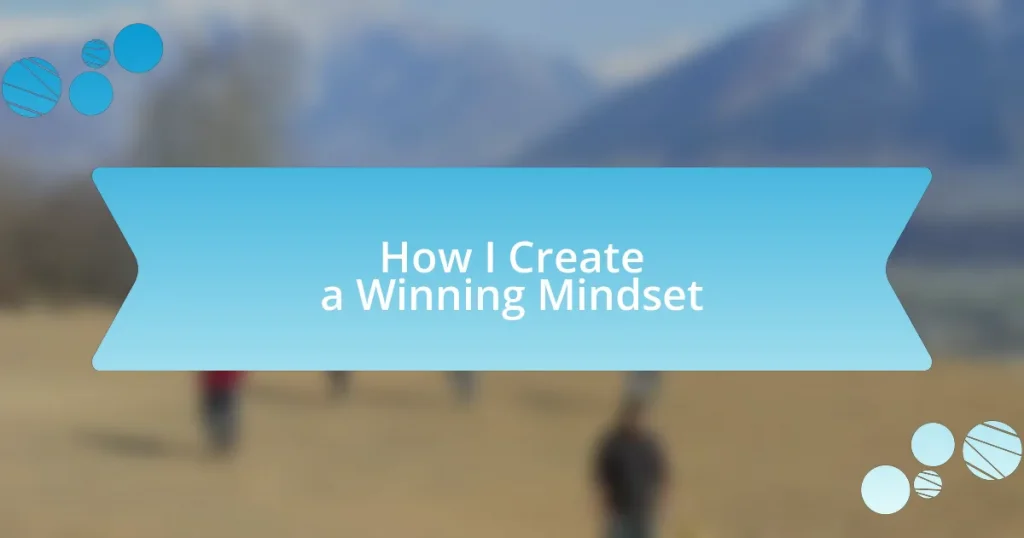Key takeaways:
- A winning mindset involves resilience, a growth-oriented perspective, and surrounding oneself with positive influences.
- Identifying dreams and goals requires self-reflection, visualization, and flexibility to adapt as interests evolve.
- Developing resilience and grit means viewing challenges as opportunities for growth and embracing discomfort.
- Consistency in daily habits, like goal-setting and self-reflection, is essential for maintaining focus and achieving a winning mindset.
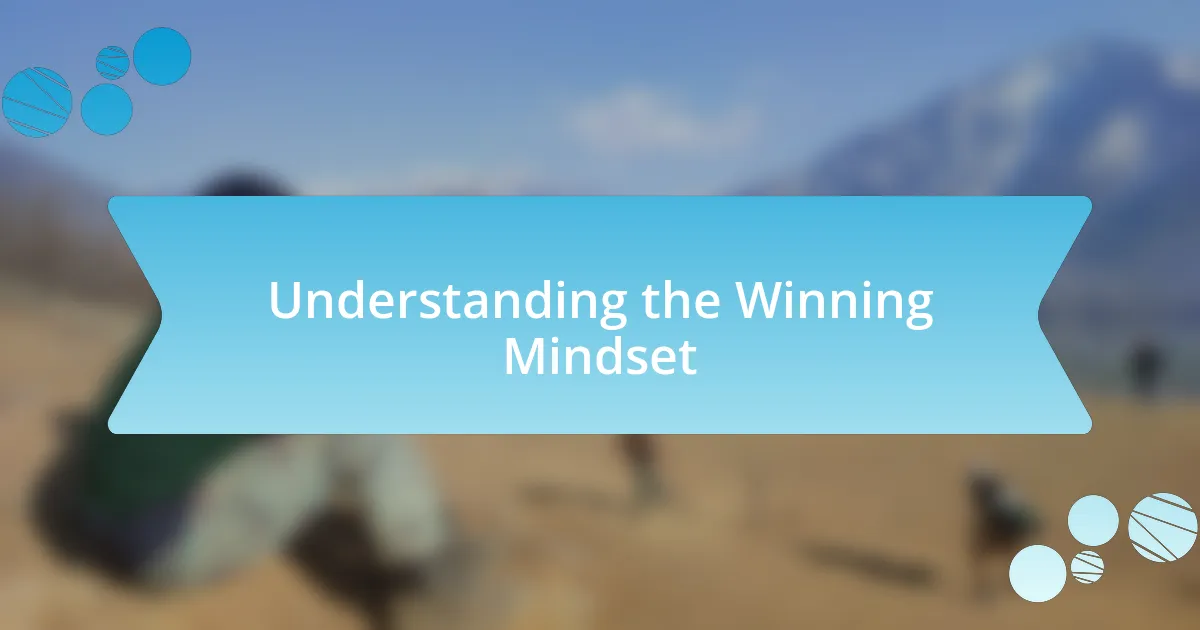
Understanding the Winning Mindset
A winning mindset goes beyond just believing you can succeed; it’s about cultivating resilience and a positive attitude even in the face of challenges. I remember preparing for a big presentation that had me frazzled. Instead of fearing failure, I focused on what I could learn from the experience, which ultimately transformed my anxiety into excitement.
This mindset is characterized by a growth-oriented perspective, which allows you to view setbacks as opportunities for growth. Have you ever faced a situation where things didn’t go as planned, but that led to a better outcome? I have, and it taught me that every failure is merely a stepping stone to greater success.
Embracing the winning mindset also involves surrounding yourself with positive influences and mentors. I found that joining a group of like-minded individuals who encouraged each other inspired my own journey. It’s incredible how energy can shift when you’re part of a supportive community—it fuels your ambition and helps you push past your limits.

Identifying Your Dreams and Goals
Identifying your dreams and goals is a deeply personal journey. I often find that taking the time to reflect on what truly resonates with my passions can streamline my focus. For instance, after a year of working in a field that didn’t excite me, I began journaling about what I enjoyed, which clarified my desire to pursue a career in teaching.
Here are some steps to consider when identifying your dreams and goals:
- Self-Reflection: Spend time contemplating your interests and values. What activities fill you with joy?
- Visualize Success: Picture where you want to be in five or ten years. This can help you create a vivid roadmap for your aspirations.
- Break It Down: Set smaller, actionable goals that lead you toward your larger dreams. This makes the process feel less overwhelming.
- Seek Feedback: Talk to friends or mentors about your ideas. Their perspectives can provide valuable insights or reveal blind spots.
- Stay Flexible: Allow your dreams to evolve as you grow. What inspires you today might change, and that’s perfectly okay.
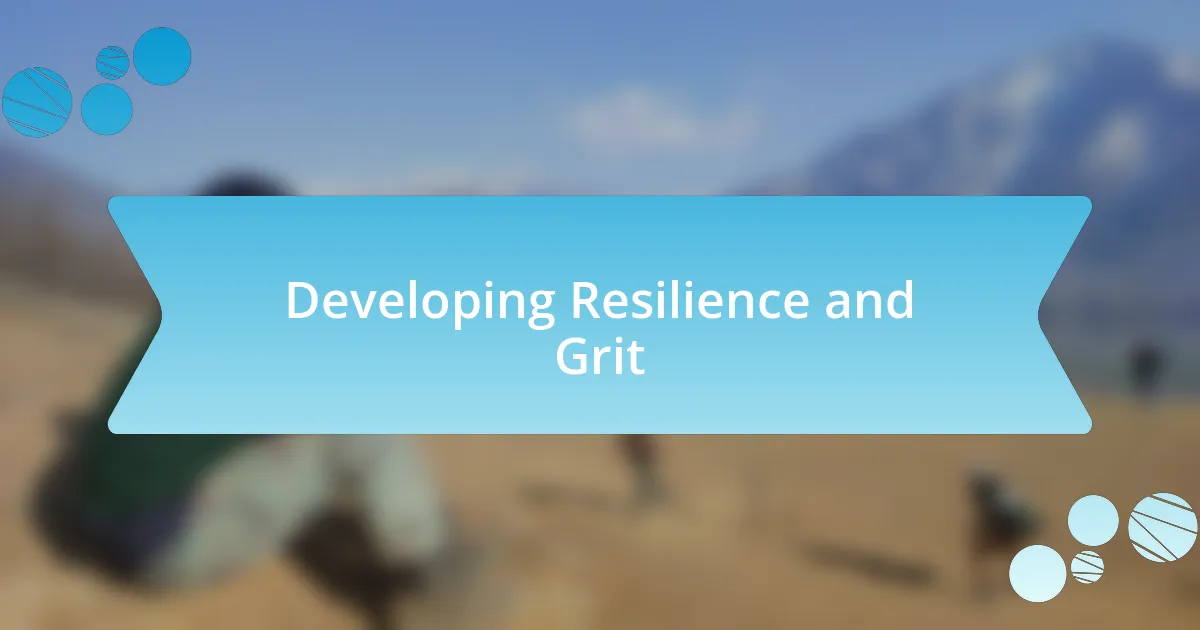
Developing Resilience and Grit
Developing resilience and grit is essential in navigating life’s ups and downs. I remember a particularly challenging time during my training for a marathon. Every time I faced a setback, whether it was an injury or a bad day, I learned to push through the discomfort. Now, I see those moments not as failures but as stepping stones that strengthened my mental toughness.
Practicing resilience means equipping yourself to bounce back from obstacles. One approach I found helpful is maintaining a growth mindset. This means viewing challenges as opportunities to learn rather than as threats. I recall failing a crucial exam in my early career; instead of allowing it to define my journey, I dedicated myself to mastering the subject. This shift in perspective cultivated grit, which has been invaluable in both professional and personal aspects of my life.
Overall, resilience and grit are not just traits; they are skills that can be developed over time. I often recommend embracing discomfort as a sign of growth. Understanding that adversity can foster development makes facing challenges feel less daunting. When you view struggles as integral to your journey, you open yourself up to greater achievements and a more fulfilling life.
| Resilience | Grit |
|---|---|
| Ability to bounce back from setbacks | Persistence toward long-term goals despite obstacles |
| Fosters emotional strength | Focuses on relentless effort |
| Can be developed through experience and reflection | Requires a passion for what you’re pursuing |
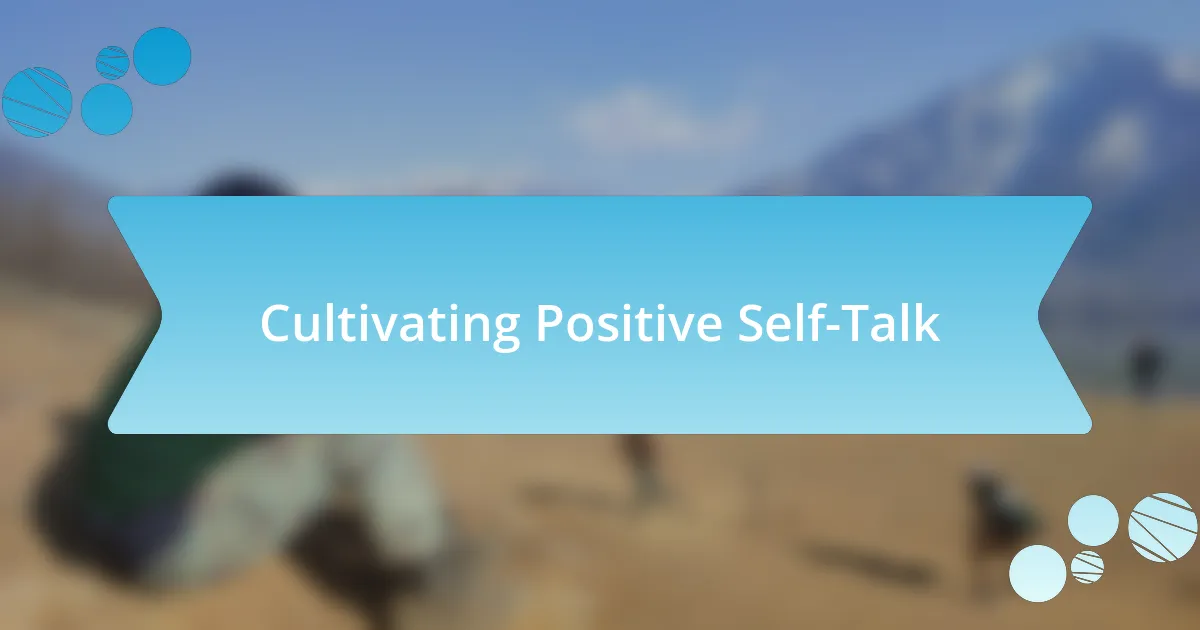
Cultivating Positive Self-Talk
Cultivating positive self-talk has been a game changer in my life. I remember a time when I would glare at my reflection and spiral into negative thoughts about my abilities. One day, I decided to flip the script. Instead of berating myself, I began to acknowledge my achievements, no matter how small. Why not celebrate progress? This simple change transformed my daily mindset, leading to greater confidence.
As I explored this concept further, I discovered the power of affirmations. I made it a habit to repeat phrases like “I am capable” or “I can tackle challenges with grace.” Initially, it felt awkward, but I gradually noticed a shift in my attitude. I began to approach tasks with a sense of assurance that I hadn’t known before. Isn’t it fascinating how words can shape our reality?
Engaging in positive self-talk is not just a mantra; it’s about creating a nurturing dialogue with ourselves. I learned that when doubts creep in, asking myself, “What would I say to a friend in this situation?” provides clarity. This practice not only reinforces my self-worth but also fosters resilience. Deep down, don’t we all crave that inner voice that supports and uplifts us?
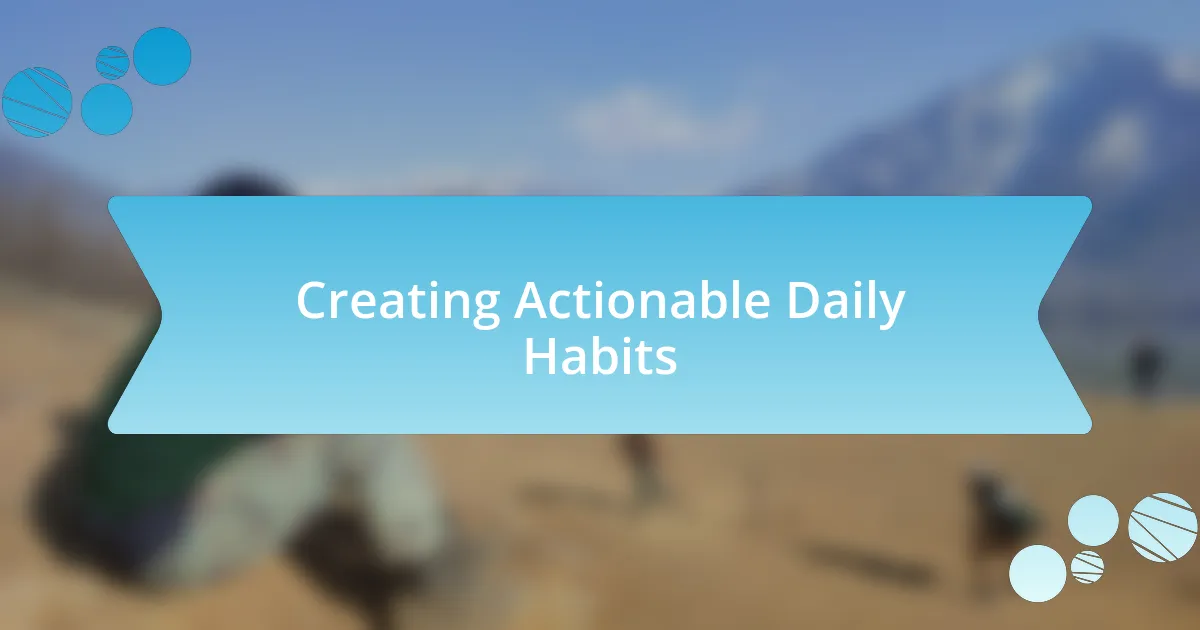
Creating Actionable Daily Habits
Creating actionable daily habits is crucial in building a winning mindset. I remember when I decided to incorporate a morning routine, starting with just five minutes of meditation. At first, it seemed insignificant, but this small commitment created a ripple effect throughout my day, making me feel more focused and centered.
As I continued this practice, I found that writing down three goals each morning helped streamline my focus. It was an enlightening realization that clarity is power. When I had specific objectives in front of me, I felt more driven to tackle whatever might come my way. Have you ever noticed how having a clear target can transform your day?
I also discovered that consistency beats intensity. By setting aside a specific time each evening to reflect on my day, I could assess my progress and adjust my actions for tomorrow. This daily habit allowed me to engage with my learning curve, turning each setback into an opportunity for growth. Doesn’t it feel rewarding to look back and acknowledge your evolution? Embracing such habits enables us to cultivate a mindset steeped in resilience and success.
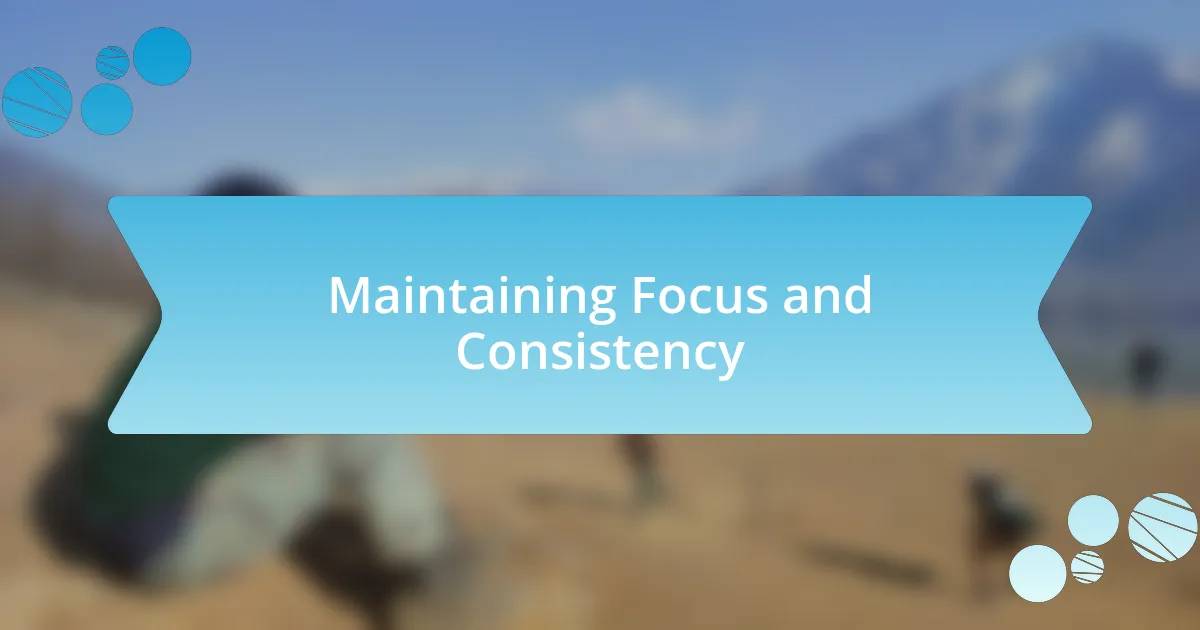
Maintaining Focus and Consistency
Maintaining focus and consistency is often where the real challenge lies. I recall a time when I struggled to stay concentrated, especially amid distractions. It was a late afternoon when I realized that blocking out time for deep work, even just an hour or two, significantly improved my productivity. Have you ever tried dedicating specific time blocks to focus? The difference can be remarkable.
To keep that focus alive, I turned to accountability partners. I remember sharing my goals with a friend and checking in weekly. It wasn’t merely about accountability; it was a shared journey that kept me committed. The emotional support we offered each other made the process enjoyable, fostering a sense of connection that fueled my determination. I often think, how often do we let sheer willpower drive us when camaraderie can be such a motivating force?
Consistency in my efforts mirrored the feeling of nurturing a plant. Initially, it took patience and care, but with time, I saw growth. I’ve learned that even on days when I’m not feeling my best, engaging in small rituals—like a quick stretch or a brief journaling session—helps me stay grounded. Isn’t it interesting how tiny gestures carry the weight of our commitment? Embracing these small acts has truly solidified my focus and transformed my approach to consistency.
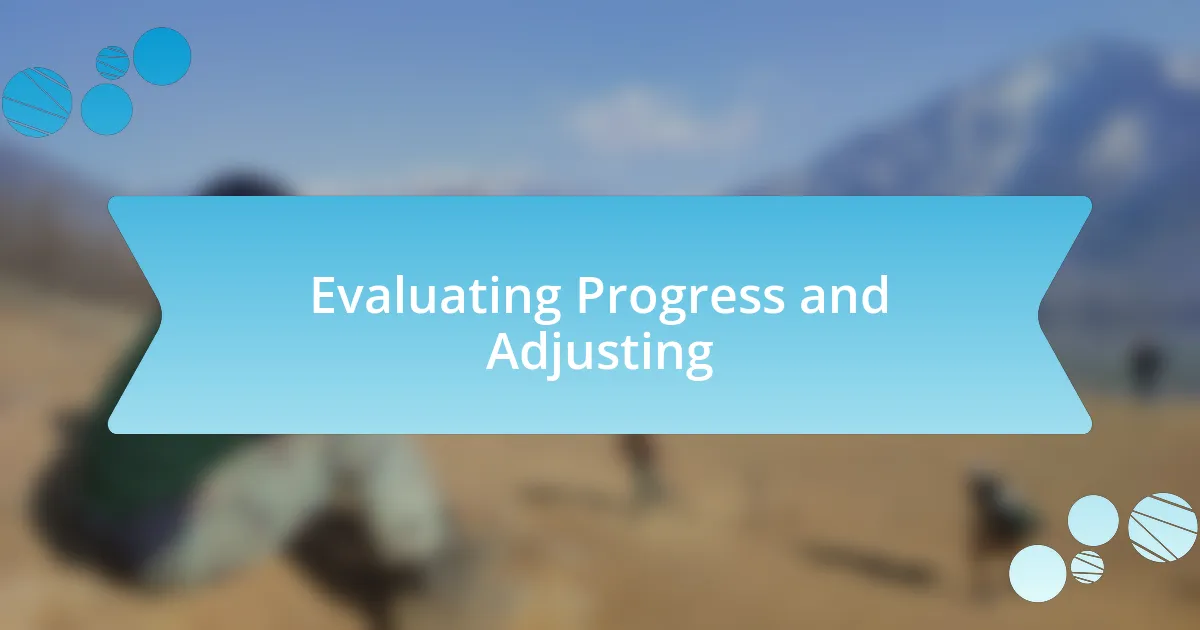
Evaluating Progress and Adjusting
Evaluating progress is crucial in cultivating a winning mindset. I once kept a journal where I recorded my daily achievements and setbacks. It was eye-opening to review these entries weekly; I could easily identify patterns in my productivity and emotions. Have you ever noticed how self-reflection can illuminate the path forward?
Adjusting my strategies became necessary as I observed my progress. For instance, I realized that certain methods were hindering my growth instead of facilitating it. I remember a specific project where I was stuck, and after evaluating my approach, I shifted to smaller, more manageable tasks. It was a relief to discover how breaking it down made the work feel lighter and less daunting.
I also learned to embrace flexibility in my plans. Admitting when something isn’t working is difficult, yet it opens the door to new opportunities. There was a time when my rigid goals led to frustration, and I had to ask myself, why am I holding on so tightly? Letting go allowed me to adapt, discovering exciting directions I hadn’t considered before.










